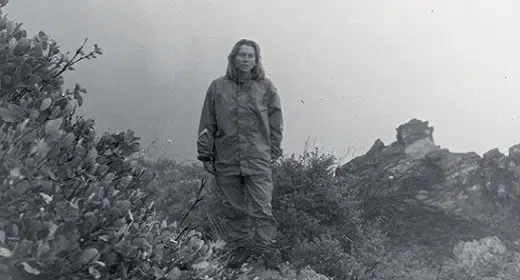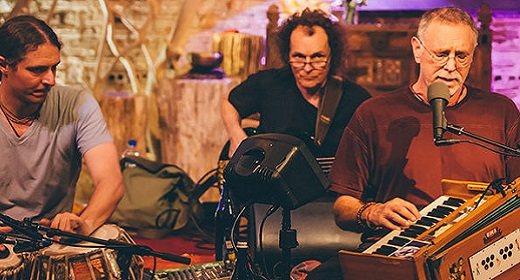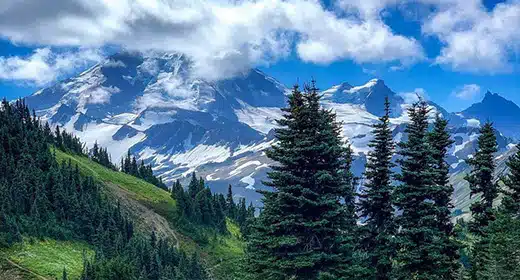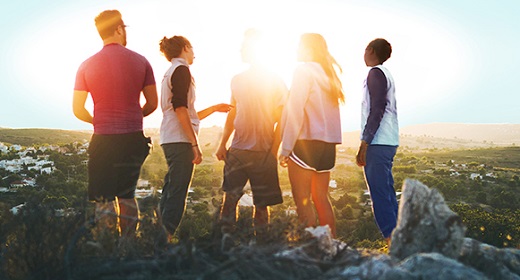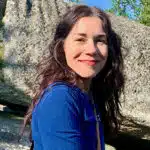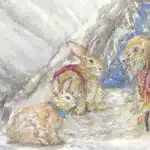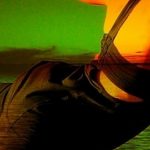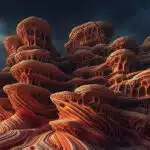by Elizabeth Hightower Allen: Ten years after the publication of ‘Wild,’ the beloved author shares her thoughts on the haters who thought she was unprepared, the transformative power of doing big things, and where Monster is now…
decade ago, Cheryl Strayed had $85,000 in credit-card debt. She was a working mom taking care of two small children and grabbing whatever time she could to write. In April of 2012, while on a book tour for her new memoir, she got a text from her husband saying the rent check had bounced.
The book she was promoting was Wild, her account of a 1995 hike covering 1,100 miles of the Pacific Crest Trail—from the Mojave Desert in Southern California to the Bridge of the Gods, which crosses the Columbia River between Oregon and Washington. During the hike she was 26 years old, on the trail alone, and fleeing the demons of divorce, heroin, and the untimely loss of her mother to cancer. She was carrying so much baggage, quite literally, that she couldn’t lift her pack.
Oprah Winfrey was so blown away by Wild that she used it to reboot her famous book club that June. Reese Witherspoon snatched up the movie rights, and she played Strayed herself in the 2014 adaptation. Ten years after its publication, Wild has been translated into 25 languages and sold more than five million copies worldwide.
After the book became a bestseller, a “Wild effect” was noted on the PCT: permits for long-distance hikers increased more than 300 percent from 2013 to 2019. It changed not just the literature of the outdoors but the outdoors itself. Strayed convinced readers that it was OK to embark on a major adventure—even as a woman alone, even as a complete hot mess.
Despite the book’s popularity, some self-appointed outdoor experts reacted as if Strayed had done something irresponsible. She was unprepared, they said, and her book had lured dangerously ill-equipped newbies onto the trails. Those critics misunderstood Wild, Strayed says now. At its heart, it’s not a story about through-hiking. It’s about her life and the universal experiences and lessons it contained. As contributing editor Mark Sundeen wrote in a piece for Outside Online just after the book’s publication, “Despite its backcover billing, Wild is not a book about hiking, travel, adventure, or nature. It’s a memoir of redemption—and wilderness just happens to be the stage.”
On Wild’s Success
“I spent so many years trying to make sense of my mother’s death and of what that hike meant to me, and I put it all in the book. For it to be received so passionately by so many people in so many different languages and cultures—it did the thing I’d always dreamed of as a writer. It reached an audience. It spoke to them. I told a deep story about my life, but what I really wanted to do was tell a deep story about the human experience. Wild spoke to people about their own experience, about their own lives and journeys and struggles, all the times they had to put one foot in front of the other and keep going. And I love that people felt like it gave them permission to go on adventures of their own.”
On the Criticism that She Wasn’t Prepared for Her PCT Hike
“When I listened to some of the arguments lodged against Wild, they were always rooted in elitism, snobbery, and a sense that the wilderness belongs to the people who have the means and the resources to prepare for it with lots of expensive equipment and intensive research. I’m opposed to that idea. I believe, of course, that you should go out there prepared. My problem wasn’t so much that I wasn’t prepared—I was overprepared. This was 1995, before we had much awareness of ultralight gear and that kind of stuff. But those trails belong to all of us. The more of us there are who love them, the more of us there’ll be to protect them.”
On Her Upbringing Outdoors
“I had a lot of experience in the wilderness. When I was 12 or 13, my family moved to northern Minnesota. My mother and stepfather bought 40 acres that were really out in the woods, 20 miles from the nearest town—and the nearest town was 400 people. My mom would always say we were like modern homesteaders. We built our own house out of fallen trees, and we stripped the bark ourselves. My stepfather was a carpenter, and he brought home scrap wood from his various projects. That’s what we made our house with. I had the sense that the wilderness was home to me. So instinctually I knew when I reached rock bottom that I needed to go to the wild places that made me feel whole again. I went on the PCT feeling that level of comfort in the wilderness.”
On Wanting to Do Big Things
“Sometimes logistically what you have time for is a week, and it’s like, Take it! That can be transformative—a day can be transformative. But what I knew in my heart was that I needed to do something big and incredible and hard and kind of epic. Years later, when I was writing Wild, I realized that what I’d given myself was a rite of passage. I needed to be tested to see who I was—in particular, who I was in the world without my mother. I really felt linked to all the cultures throughout time that have given their youth opportunities for rites of passage. They’re always like, You have to do it alone, it has to be a hard thing, it has to be something that pushes you beyond what you think you can do. For me, going for a long time was part of it. I didn’t hike the entire Pacific Crest Trail, but I hiked for 94 days. And that was long enough—I lived outside for a season, and I lived in the wild, and I got myself a long distance by foot. Those were all really big, hard things that ended up being transformative.”
On Through-Hiking Before Cell Phones Existed
“When I was writing Wild, I was quite cognizant that I was writing a historical document of what backpacking in America used to be like, because this was before cell phones. I’m out there with no electronics. I have no music. The only music I have is the music I make myself. I talk about the songs, the jingles, all the things that went through my head because my mind was trying to occupy itself. I would think about deep, important things, but most of the day I’d be trying to remember the lyrics to, like, Joni Mitchell’s Blue so I could sing it to myself, or I’d be thinking in great detail about what it tastes like to bite into a cheeseburger.”
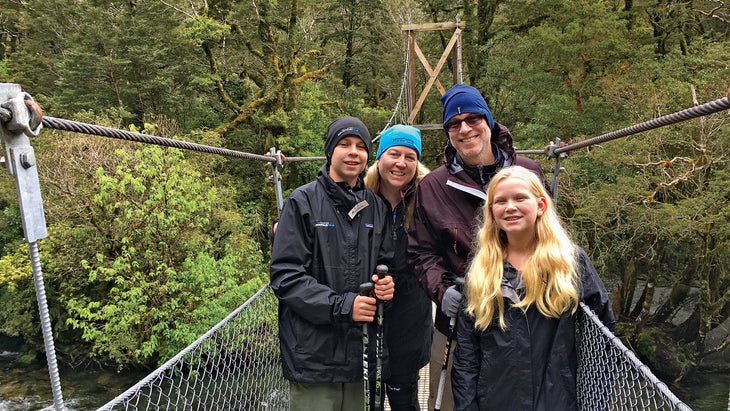
On Feeling Connected to Nature
“When you’re out there every day, looking at the trees and the grasses and the flowers and the mice and the deer and the bears and the snakes, all the things of the world, you realize that you are part of them, you are a part of this world. It’s the opposite of feeling alienated, where you’re alone in a crowded room, or you’re scrolling through Instagram and feeling like you’re not like anyone else. I felt the opposite of that on the Pacific Crest Trail. I think those experiences make us tender. They make us feel compassionate toward ourselves, and that extends to others as well.”
On the Attachment She Had to Her Backpack, Monster
“Anyone who has done any backpacking at all knows that you develop a relationship with the objects you bring with you. Many took on a sort of talisman quality for me. Frankly, even my backpack did. I nicknamed it Monster because it felt like it had an almost animated presence. It felt like my companion, and it held everything I needed, which is both a literal truth and a metaphorical one. It was my link to survival—I carried it, and it carried me. It was not until years later, when I was writing Wild, that I was like, Wow, I called it Monster. It’s literally the monster on my back, on this trail where I’m dealing with some of my demons and contending with my grief. I still have Monster. I didn’t know that Monster was going to be famous, so I just brought him up to my attic, and he still lives there. I still use Monster when I go backpacking.”
On How Wild Fits into the Outdoor-Lit Canon
“I was really conscious that I was writing in a certain literary tradition. I was both writing in it and writing against it, especially the man-versus-nature narrative. I didn’t want to present myself as anyone other than who I was, which was very human—not some kind of hero conquering the wild, but a woman boldly stepping into it and trying to find a home. I did not write Wild because I took a hike on the Pacific Crest Trail; I wrote Wild because I’m a writer. There’s a difference between those two things. I knew the point of Wild wasn’t going to be, Look at me, I’m so interesting, I took a hike. I knew that a lot of people had hiked a lot longer, a lot better, a lot more expertly. I wanted to find that universal human story that wasn’t just about me but about those bigger questions, about how journeys change us, how we bear what we think we cannot bear.”
On Adventures She’s Had Since the Book Was Published
“My two favorite things were always hiking and reading, and I still love both. I haven’t gone on a hike that long since 1995, but I’ve taken extended trips with my kids. A few years ago, my son, my daughter, my husband, and I went to New Zealand and hiked the Milford Track and the Routeburn Track in Fiordland National Park. That country is just a dream for anyone who loves to hike or backpack. My kids left me and my husband in the dust. They’re so much fitter, so much faster. They were up there with the guide the whole time, leading the charge. It felt like a passing of the torch, to give my kids the love of hiking as well.”
On What She’d Tell Her Daughter if She Wanted to Hike the PCT
“I’d say, Go! Trust yourself. Trust your instincts. Believe in your ability to persevere through hard times, because there will be hard times. It will be beautiful. It will be fun. It will be glorious. And yes, it will also be miserable and awful and agonizing and tedious and boring and harder than you could ever imagine. And that’s the good news, because those are the things that teach us who we are, that show us our truest, deepest, strongest, bravest selves. And yes, I really want my daughter and my son to have that experience. I really want all of us to have that experience.”







